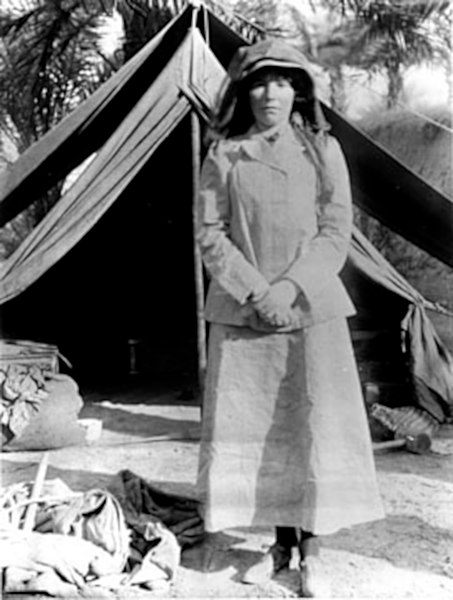Heroes of History: Gertrude Bell
by Scott Dutfield · 15/07/2019

Archaeologist, advisor, adventurer – meet the Victorian queen of the desert
In a time when British women were expected to stay at home and raise a family, Gertrude Bell was busy climbing mountains and riding camels across the desert. Born into a wealthy family, she could have easily chosen a comfortable domestic life, but instead she swapped the UK’s northeast for the Middle East and a life of adventure and politics.
Her parents were supportive of her ambitions, encouraging her to become one of the few women at the time to study at Oxford University. After receiving her degree in modern history she left to travel the world, visiting places not typically seen by Europeans. As well as scaling mountains in the Alps, she trekked along the Euphrates River and crossed the Syrian Desert, often alone with only hired guides for company.
Although Bell had a great fascination for many different cultures, it was Mesopotamia that really stole her heart. She loved meeting with and photographing the Arab people and visiting their archaeological wonders. They seemed to admire her in return – she was often addressed as ‘khutan’, meaning ‘queen’ in Persian and ‘respected lady’ in Arabic, and it was this special relationship that caught the attention of the British Intelligence Service.
When World War One broke out and the Ottoman Empire took Germany’s side, Bell was enlisted into the Arab Bureau, an operation that sought to secure British interests in the Middle East. Working alongside TE Lawrence, better known as Lawrence of Arabia, she used her in-depth knowledge of the region to help draw up maps for the army. She went on to have great political influence as the only woman working for the British Government in the Middle East, and even helped to establish the borders for the new country of Iraq.
Despite her involvement in politics, Bell’s first passion had always been archaeology, which she returned to in her later years. She was made Iraq’s honorary director of antiquities and supervised many archaeological missions in the country, collecting exhibits for the Baghdad Archaeological Museum.
Sadly, shortly after the museum opened Bell died suddenly from an overdose of sleeping pills. Whether this was accidental or intentional, no one knows. Large crowds attended her funeral in Baghdad, and King Faisal of Iraq dedicated a wing of the museum to her. To this day the khutan is thought of fondly in the region, and her story lives on in the letters and photographs she sent home from the desert.
The Big Idea: The woman who helped create a kingdom
After World War One had ended and the Ottoman Empire had been defeated, there was much confusion about British policy in the Middle East. Some believed Mesopotamia should remain under British rule, while others, including Gertrude Bell, believed in Arab independence. After writing a white paper for Parliament on the state of the region, the first ever written by a woman, Bell attended Winston Churchill’s 1921 Cairo Conference and eventually got her way. She helped to draw up the borders of the new state of Iraq and appoint its first ruler, King Faisal I, while still helping to maintain British influence in the region.
5 things to know about… Gertrude Bell
Bell never married. Her father did not approve of her first love, British diplomat Henry Cadogan, and her second, the married British officer Dick Doughty-Wylie, was shot in Gallipoli in 1915.
As well as writing books about her travels, Bell also wrote over 1,600 letters to her family and friends, which have been published online by the University of Newcastle, UK
While mountain climbing in Switzerland in 1902, Bell was caught in a blizzard and had to spend more than 50 hours clinging to a rope on the north slope of the Finsteraarhorn.
Bell could speak eight different languages, including French, Persian and Arabic. In 1897, she published her translations of the works of Persian poet Hafiz, which still prove popular today.
The 2015 Werner Herzog film Queen of the Desert tells the story of Gertrude Bell’s life, featuring Kidman as Bell, Damien Lewis as Dick and Robert Pattinson as Lawrence of Arabia
This article was originally published in How It Works issue 115, written by Jo Stass
For more science and technology articles, pick up the latest copy of How It Works from all good retailers or from our website now. If you have a tablet or smartphone, you can also download the digital version onto your iOS or Android device. To make sure you never miss an issue of How It Works magazine, subscribe today!




